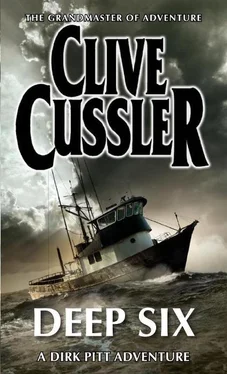“What exactly are you trying to tell me?”
Emmett looked at Brogan for help and then shrugged. “The idea is difficult to put across, but Martin and I believe the President is under some sort of… well… mind control.”
Oates wasn’t sure he heard right. But logic told him the directors of the CIA and FBI were not men to make light of a serious allegation.
“Controlled by whom?”
“We think the Russians,” answered Brogan. “But we haven’t accumulated all the evidence yet.”
“We realize this sounds like science fiction,” Emmett explained, “but it appears very real.”
“My God, was the President under this influence as you suggest, when he flew to Mauritania for his talks with Antonov?”
Brogan and Emmett exchanged knowing looks. Then Brogan said, “There isn’t a plane in flight anywhere in the world the Agency doesn’t know about. I’ll stake my job that our data will show no trace of an aircraft flying on a course from Maryland to Mauritania and return.”
Oates’s eyes widened. “The meeting with Antonov…”
Emmett shook his head slowly. “It never happened.”
“Then everything — the disarmament, the agricultural trade agreements — was a lie,” said Oates, his voice cracking slightly.
“A fact which is heightened by his vague denial of the Eagle murders,” added Brogan.
“Why did he conceive such a crazy nightmare?” Oates asked dazedly.
“It really doesn’t matter why he came up with it,” said Emmett. “The programs probably were not even his idea. What matters is how his behavior is guided. Who is motivating his thought patterns, and from where?”
“Can we find out?”
“Yes,” said Emmett. “That’s why we wanted to catch you before you cut bait.”
“What can I do?”
“Stay,” Brogan replied. “The President is not fit for office. With Margolin, Moran and Larimer still missing, you remain the next man in line.”
“The President must be held in check until we can finish our investigation,” said Emmett. “With you at the helm, we keep a measure of control in the event he must be removed from office.”
Oates straightened and took a deep breath. “Lord, this is beginning to sound like a conspiracy to assassinate the President.”
“In the end,” Brogan said grimly, “it may well come to that.”
Lugovoy turned from his notes and stared at his staff neurologist, who sat at the console monitoring the telemetric signals.
“Condition?”
“Subject has entered a relaxed state. Brain rhythms indicate normal sleep patterns.” The neurologist looked up and smiled. “He doesn’t know it, but he’s snoring.”
“I imagine his wife knows it.”
“My guess is she sleeps in another bedroom. They haven’t had sex since he returned.”
“Body functions?”
“All reading normal.”
Lugovoy yawned and read the time. “Twelve minutes after one A.M.”
“You should get some sleep, Doctor. The President’s internal clock wakes him between six and six-fifteen every morning.”
“This is not an easy project,” Lugovoy groused. “The President requires two hours’ less sleep than I do. I detest early risers.” He paused and scanned the polysomnography screen that monitored the President’s physiological parameters accompanying his sleep. “It appears he’s dreaming.”
“Be interesting to see what the President of the United States dreams about.”
“We’ll get a rough idea as soon as his brain cell activity goes from coordinated thought patterns to disjointed abstractions.”
“Are you into dream interpretations, Doctor?”
“I leave that to the Freudians,” Lugovoy replied. “I am one of the few who believe dreams are meaningless. It’s merely a situation where the brain, freed from the discipline of daytime thinking, goes on holiday. Like a city dog who lives in an apartment and is unleashed in the country, running in no particular direction, enjoying the new and different smells.”
“There are many who would disagree.”
“Dreams are not my specialty, so I cannot argue from a purely scientific base. However, I put it to you that if they do have a message, why are most of the senses usually missing?”
“You’re referring to the absence of smell and taste?”
Lugovoy nodded. “Sounds are also seldom recorded. The same with touch and pain. Dreams are primarily visual sensations. So my own opinion, backed up by little personal research, is that a dream about a one-eyed goat who spits fire is simply that: a dream about a one-eyed goat who spits fire.”
“Dream theory is the cornerstone of all psychoanalytic behavior. With your esteemed reputation, you’d shatter quite a few established icons with your goat opinion. Think how many of our psychiatrist comrades would be out of a job if it became known that dreams are meaningless.”
“Uncontrolled dreams are quickly forgotten,” Lugovoy continued. “But the demands and instructions we transmit to the President’s brain cells while he is asleep will not be received as dreams. They are injected thoughts that can be recalled and acted upon by outside stimuli.”
“When should I begin programming his implant unit?”
“Transmit the instructions shortly before he wakes up, and repeat them when he sits down at his desk.” Lugovoy yawned again. “I’m going to bed. Ring my room if there is a sudden change.”
The neurologist nodded. “Rest well.”
Lugovoy stared briefly at the monitoring system before he left the room. “I wonder what his mind is envisioning?”
The neurologist waved casually at the data printer. “It should be there.”
“No matter,” said Lugovoy. “It can wait till morning.” Then he turned and walked to his room.
His curiosity needled, the neurologist picked up the top printout sheet containing the President’s interpreted brainwaves and glanced at the wording.
“Green hills of summer,” he muttered to himself as he read. “A city between two rivers with many Byzantine-style churches topped by hundreds of cupolas. One called St. Sophia. A river barge filled with sugar beets. The Catacombs of St. Anthony. If I didn’t know better, I’d say he was dreaming about the city of Kiev.”
He stood beside a pathway on a hill overlooking a wide river, gazing at the ship traffic and holding an artist’s brush. On the tree-covered slope below him he could see a large stone pedestal beneath a figure draped in robes and holding a tall cross as though it were a staff. An easel with a canvas stood slightly off to his right. The painting was nearly finished. The landscape before his eyes was perfectly mirrored in the exacting brush strokes, down to the stippled leaves in the trees. The only difference, if one looked close enough, was the stone monument.
Instead of a long flowing beard of some forgotten saint, the head was an exact likeness of Soviet President Georgi Antonov.
Suddenly the scene changed. Now he found himself being dragged out of a small cottage by four men. The cottage walls were carved with Gothic designs and it was painted a garish blue. The faces of his abductors were indistinct, yet he could smell their unwashed sweat. They were pulling him toward a car. He experienced no fear but rather blind rage and lashed out with his feet. His assailants began beating him, but the pain felt distant as though the agony belonged to someone else.
In the doorway of the cottage he could see the figure of a young woman. Her blond hair was raised in a knot atop her head and she wore a full blouse and a peasant skirt. Her arms were upraised and she seemed to be pleading, but he could not make out the words.
Then he was thrown on the rear floor of the car and the door slammed shut.
Читать дальше












